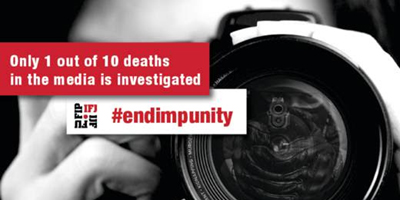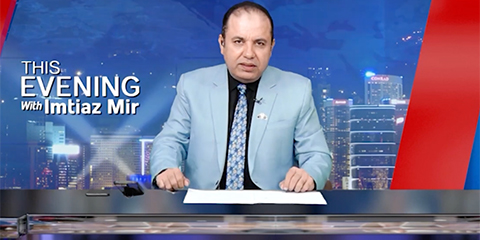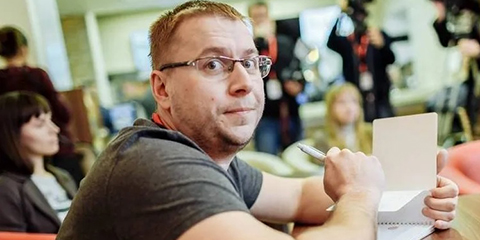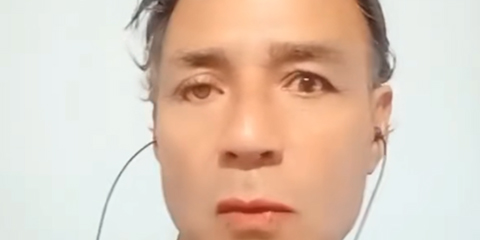
PFUJ calls for end to Impunity for Crimes Against Journalists
November 02, 2025: PFUJ urges Pakistan’s federal and provincial governments to end Impunity for Crimes Against Journalists and ensure their safety and press freedom.
JournalismPakistan.com | Published 10 years ago
Join our WhatsApp channel
BRUSSELS: The International Federation of Journalists (IFJ) has urged United Nations Member States to commit to seeking and extending judicial cooperation in investigating and prosecuting killings of journalists.
The IFJ, which has launched its annual campaign against impunity for crime targeting journalists, also called on financial institutions and aid donors to make respect for press freedom and media protection among key criteria for development aid to countries with high levels of violence in journalism.
The IFJ’s call was made on the second commemoration of the UN Day against impunity for crime targeting journalists. To mark the day, the federation was holding a media event at Residence Palace in Brussels, as part of activities organized by the IFJ and its affiliates for its annual campaign against impunity for violence in journalism.
"It is important for UN Member States to give real meaning to the day against impunity for crime targeting journalists," said IFJ President Jim Boumelha. "We are urging them to cooperate through sharing technical expertise and know-how, training as well as best practices in investigating killings of journalists in order to make a difference to a situation which has become a safety crisis in media. That kind of assistance would further expose repressive regimes which continue to put journalism to the sword and heap more pressure on them to abide by their international obligations."
The IFJ has been recording killings of journalists and media professionals for 25 years including at least 85 killed since the start of 2015 and says there is very little use made of capacity, experience and skills which many UN Member States can share among themselves to solve journalists’ murders. The federation proposes an integrated strategy, in the framework of the UN Action Plan on the issue of impunity and the safety of journalist, with special focus on the promotion of close collaboration between governments’ laws enforcement agencies and specialised international institutions such as the UN Office of Drugs and Crime to investigate violence on journalists.
While welcoming the decision of UNESCO Director General to seek information from governments on action taken about killings of journalists, the federation notes that the voluntary basis on which the information is provided and the fact that the UN agency lacks the mandate to challenge governments represent weakness in the initiative. In many cases, governments claim lack of evidence to identify and punish the journalists’ attackers or provide information of little use.
The IFJ has long campaigned for linking development and economic aid to genuine commitment to respect journalists' rights and was among the press freedom organizations which made a successful case for such measures by the European Union leading to the suspension of an economic partnership with Sri Lanka in 2009. It therefore believes that targeted financial sanctions can contribute to the fight against impunity for journalists’ killers.
"In addition to judicial cooperation among states, the IFJ stresses the need for international instruments to be implemented and for the UN to get tough on unwilling and corrupt governments," added Anthony Bellanger, IFJ General Secretary. "Murder is a crime which must be punished. Today, we urge the UN, its agencies and other international institutions such as the World Bank and IMF to take all necessary measures, including financial sanctions, to bring to an end impunity for killings of journalists who play a public role. Impunity is an attack on freedom of expression and, ultimately, denies fundamental human rights to the public. Now is time for everyone to take their responsibilities and act accordingly."
The UN Day against impunity for crime targeting journalists was adopted by the UN General Assembly on 18 December 2013. The UN Day falls on the date when two RFI journalists, Ghislaine Dupont and Claude Verlon, were murdered in Kidal, Mali, in 2013. Last May, the UN Security Council adopted Resolution 2222 on the protection of journalists, the second resolution on media safety following its earlier resolution 1738 adopted in 2006 for the protection of journalists working in war zones. - IFJ

November 02, 2025: PFUJ urges Pakistan’s federal and provincial governments to end Impunity for Crimes Against Journalists and ensure their safety and press freedom.

November 02, 2025: Impunity for crimes against journalists deepens worldwide as Pakistan reports a 60 percent surge in attacks and weak enforcement of safety laws.

November 01, 2025: Pakistan Press Foundation reports 137 attacks on journalists in 2025, highlighting rising threats, legal harassment, and censorship on the International Day to End Impunity.

November 01, 2025: A viral Samaa TV clip featuring MNA Sher Afzal Marwat’s crude remarks and Talat Hussain’s laughter raises questions about the declining ethics of Pakistani television.

October 31, 2025: Police foiled a plot to kill DawnNewsTV journalist Tahir Naseer in Rawalpindi after arresting suspects hired for Rs200,000. Naseer says threats followed his reporting.

October 31, 2025: CPJ calls on Pakistan to bring Imtiaz Mir’s killers to justice after the journalist was allegedly murdered by a banned militant group in Karachi.

October 30, 2025: The PFUJ has condemned a fabricated drug case against journalist Matiullah Jan, calling it an attempt to silence him and urging authorities to quash the charges immediately.

October 30, 2025: NewsOne TV remains on air but faces mass layoffs and delayed salaries, exposing Pakistan’s worsening media crisis and financial instability.

November 02, 2025 Independent outlet All About Macau to halt print and online operations amid rising pressure, financial strain, and legal threats, sparking press freedom concerns in the city.

November 01, 2025 Belarus court jails journalist Siarhei Chabotska for extremism and defaming the president, highlighting Minsk’s ongoing crackdown on press freedom.

November 01, 2025 Mexican journalist Miguel Angel Beltran was found murdered in Durango. CPJ urges authorities to ensure justice amid rising violence against journalists in Mexico.

November 01, 2025 UNESCO survey finds one-third of media lawyers cannot effectively defend journalists due to threats, limited resources, and lack of specialization.

October 31, 2025 Radio Free Asia, a US government-funded broadcaster covering tightly controlled Asian media environments, has suspended all news operations after federal funding dried up.